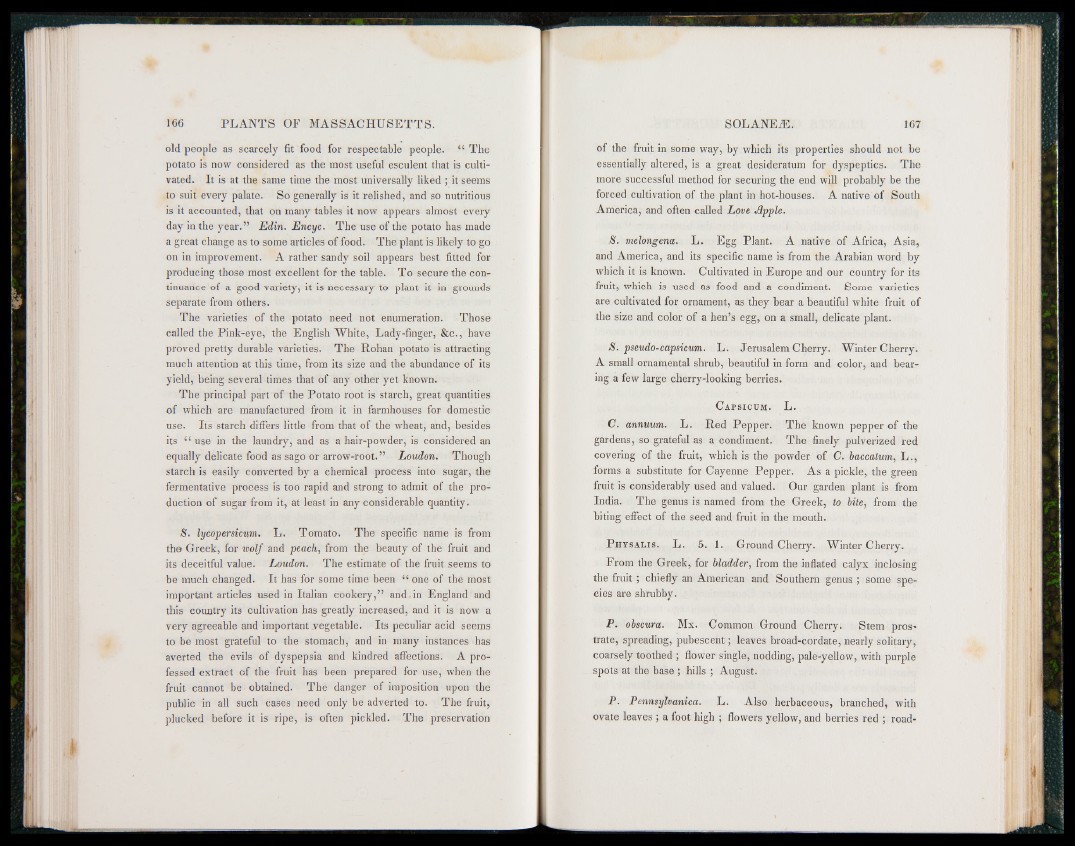
old people as scarcely fit food for respectable people. 44 The
potato is now considered as the most useful esculent that is cultivated.
It is at the same time the most universally liked ; it seems
to suit every palate. So generally is it relished, and so nutritious
is it accounted, that on many tables it now appears almost every
day in the year.” Edin. Encyc. The use of the potato has made
a great change as to some articles of food. The plant is likely to go
on in improvement. A rather sandy soil appears best fitted for
producing those most excellent for the table. To secure the continuance
of a good variety, it is necessary to plant it in grounds
separate from others.
The varieties of the potato need not enumeration. Those
called the Pink-eye, the English White, Lady-finger, &c., have
proved pretty durable varieties. The Rohan potato is attracting
much attention at this time, from its size and the abundance of its
yield, being several times that of any other yet known.
The principal part of the Potato root is starch, great quantities
of which are manufactured from it in farmhouses for domestic
use. Its starch differs little from that of the wheat, and, besides
its 44 use in the laundry, and as a hair-powder, is considered an
equally delicate food as sago or arrow-root.” Loudon. Though
starch is easily converted by a chemical process into sugar, the
fermentative process is too rapid and strong to admit of the production
of sugar from it, at least in any considerable quantity.
S. lycopersicum. L. Tomato. The specific name is from
the> Greek, for wolf and peach, from the beauty of the fruit and
its deceitful value. Loudon. The estimate of the fruit seems to
be much changed. It has for some time been 46 one of the most
important articles used in Italian cookery,” and-in England and
this country its cultivation has greatly increased, and it is now a
very agreeable and important ^vegetable. Its peculiar acid seems
to be most grateful to the stomach, and in many instances has
averted the evils of dyspepsia and kindred affections. A professed
extract of the fruit has been prepared for use, when the
fruit cannot be obtained. The danger of imposition upon the
public in all such cases need only be adverted to. The fruit,
plucked before it is ripe, is often pickled. The preservation
of the fruit in some way, by which Its properties should not be
essentially altered, is a great desideratum for dyspeptics. The
more successful method for securing the end will probably be the
forced cultivation of the plant in hot-houses. A native of South
America, and often called Love Apple.
S. melongena. L. Egg Plant. A native of Africa, Asia,
and America, and its specific name is from the Arabian word by
which it is known. Cultivated in Europe and our country for its
fruit, which is used as food and a condiment. Some varieties
are cultivated for ornament, as they bear a beautiful white fruit of
the size and color of a hen’s egg, on a small, delicate plant.
S. pseudo-capsicum. L. Jerusalem Cherry. Winter Cherry.
A small ornamental shrub, beautiful in form and color, and bearing
a few large cherry-looking berries.
C apsicum. L.
C. annuum. L. Red Pepper. The known pepper of the
gardens, so grateful as a condiment. The finely pulverized red
covering of the fruit, which is the powder of C. baccatum, L .,
forms a substitute for Cayenne Pepper. As a pickle, the green
fruit is considerably used and valued. Our garden plant is from
India. The genus is named from the Greek, to bite, from the
biting effect of the seed and fruit in the mouth.
P hysalis. L. 5. 1. Ground Cherry. Winter Cherry.
From the Greek, for bladder, from the inflated calyx inclosing
the fruit; chiefly an American and Southern genus ; some species
are shrubby.
P. obscura. Mx. Common Ground Cherry: Stem prostrate,
spreading, pubescent; leaves broad-cordate^ nearly solitary,
coarsely toothed ; flower single, nodding, pale-yellow, with purple
spots at the base ; hills ; August.
P. Pennsylvanica. L. Also herbaceous, branched, with
ovate leaves ; a foot high ; flowers yellow, and berries red : road